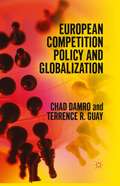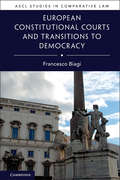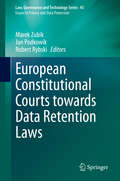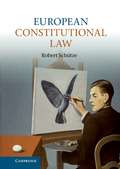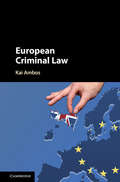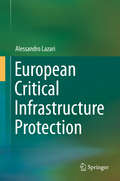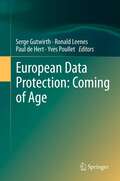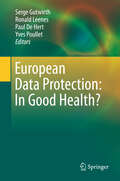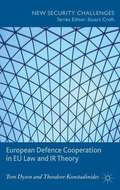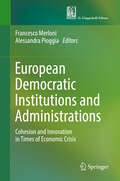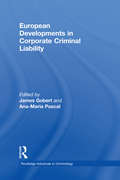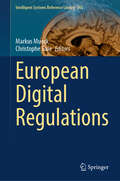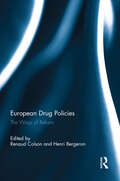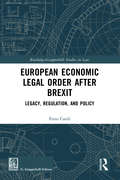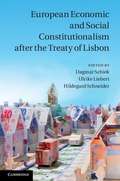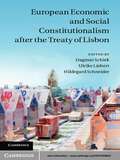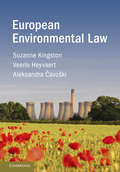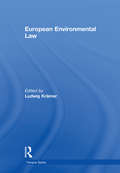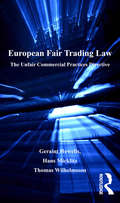- Table View
- List View
European Competition Policy and Globalization (Palgrave Studies In European Union Politics Ser.)
by Chad Damro Terrence GuayThis book examines the domestic and international dimensions of European Union (EU) competition policy, particularly mergers, anti-competitive practices and state aids. The authors argue that important changes in EU competition policy are having profound effects on the global political economy, and these changes are best understood as European Commission responses to new domestic and international pressures. Using a two-level game analytical framework that is both intra-EU and global in scope, Damro and Guay investigate a wide variety of domestic and foreign public and private actors that interact in crucial ways to determine the development and implementation of EU competition policy. They address this broad question: In what ways do changing external and internal factors affect the evolution of the EU's competition policy and the role that the Commission plays in it? Among the conclusions is that the EU – and particularly the European Commission – has become a leading global regulator.
European Condominium Law
by Cornelius Van Der MerweThis is the first comprehensive comparative treatment of condominium (apartment ownership, commonhold, horizontal property) law in 21 European jurisdictions. This book explores the genesis of condominium law in Europe and in each of the jurisdictions represented and the use made of the condominium format to structure residential, commercial, industrial and tourist condominiums. It examines the establishment of condominiums, basic condominium concepts and the role by-laws play in establishing harmony in a condominium. Included are ten case studies, which illustrate a variety of factual scenarios and focus on providing legal solutions to practical cases. The scenarios include, amongst others, the legal consequences of a sale of apartments from building plans; restrictions on the sale and letting of apartments; the keeping of pets and the conduct of a profession (such as a medical practice) in an apartment; the sanctions against defaulters of contributions; and the requirements for undertaking maintenance and improvements.
European Constitutional Courts and Transitions to Democracy (ASCL Studies in Comparative Law)
by Francesco BiagiThis book brings together research on democratization processes and constitutional justice by examining the role of three generations of European constitutional courts in the transitions to democracy that took place in Europe in the twentieth century. Using a comparative perspective, the author examines how the constitutional courts during that period managed to ensure an initial full implementation of the constitutional provisions, thus contributing - together with other actors and factors - to the positive outcome of the democratization processes. European Constitutional Courts and Transitions to Democracy provides a better understanding of the relationship between transitions to democracy and constitutionalism from the perspective of constitutional courts.
European Constitutional Courts towards Data Retention Laws (Law, Governance and Technology Series #45)
by Marek Zubik Jan Podkowik Robert RybskiThe book analyses the impact the jurisprudence of the constitutional courts of EU Member States and the Court of Justice of the European Union has had on the perception of freedom of communications in the digital era with respect to these courts’ judgments regarding regulating storage and access to telecommunications data (known as telecommunications data retention) from 2008 to 2017. To do so, it examines the jurisprudence of the constitutional courts of Austria, Bulgaria, Cyprus, Czech Republic, Ireland, Germany, Poland, Portugal, Romania, Slovenia, and Slovakia, i.e. those courts that have already ruled on domestic provisions regulating telecommunications data retention. Further, it investigates the judgments of the Court of Justice of European Union regarding directive 2006/24/EC regulating telecommunications data retention along with relevant jurisprudence of the European Court of Human Rights. As such, the book provides a comparative study of jurisprudence and national measures to implement the Data Retention Directive. Moreover, the book discusses whether our current understanding of protection of freedom of communications guaranteed by the constitutions of EU member states and the EU Charter of Fundamental Rights, which was developed in the era of analogue communications, remains accurate in the era of digital technologies and mass surveillance (simultaneously applied by states and private corporations). In this context, the book reconstructs constitutional standards that currently apply in the EU towards data retention. This book presents a unique comparative analysis of all judgments concerning Directive 2006/24/EC, which can be used in the legislative process on the EU forum aimed at introducing new principles of data retention and by constitutional courts in the context of comparative argumentation.
European Constitutional Law
by Robert SchützeThe European Union has existed for over half a century. Having started as the 'Europe of the Six' in a specific industrial sector, the Union today has twenty-seven Member States and acts within almost all areas of social life. The Union's constitutional structures have evolved in parallel with this immense growth. Born as an international organisation, the Union has developed into a constitutional Union of States. This textbook analyses the constitutional law of the European Union after Lisbon in a clear and structured way. Examining the EU through a classic constitutional perspective, it explores all the central themes of the course: from the history and structure of the Union, the powers and procedures of its branches of government, to the rights and remedies of European citizens. A clear three-part structure and numerous illustrations will facilitate understanding. Critical and comprehensive, this is required reading for all students of European constitutional law.
European Constitutional Law
by Robert SchützeWritten with exceptional clarity and fully updated from the first edition, the second edition of European Constitutional Law constitutes a classic textbook for students and practitioners of European law. Using a clear structural framework, the text guides readers through all of the core constitutional topics of EU law. Extracts from classic case law are complemented with extensive and critical discussion of the theoretical and practical aspects of the European Union and its law, leading students to a deep understanding of the subject. Chapters are enriched with more than fifty colour figures and tables, which clarify complex topics and illustrate relationships and processes. New suggestions for further reading direct students to significant pieces of academic literature for deeper self-study, and a companion website with full 'Lisbonised' versions of the cases cited in the text completes the learning package. Integrates numerous case extracts while maintaining a continuous, single-authored narrative, and combines straightforward explanations with scholarly analysis, highlighting theoretical approaches and key academic debates. A new two-colour design emphasises case extracts and enhances figures and tables, and two new appendices provide guidance on finding, reading and understanding EU law. A new companion website includes full 'Lisbonised' versions of the cases cited in the text, organised by chapter for quick and easy access.
European Consumer Access to Justice Revisited
by Stefan WrbkaEuropean Consumer Access to Justice Revisited takes into account both procedural and substantive law questions in order to give the term 'access to justice' an enhanced meaning. Specifically, it analyses developments and recent trends in EU consumer law and aims to evaluate their potential for increasing consumer confidence in the cross-border market. Via a critical assessment of the advantages and disadvantages of the means initiated at the EU level, the author highlights possible detriments to the cross-border business-to-consumer (B2C) market. To remedy this, he introduces an alternative method of creating a legal framework that facilitates B2C transactions in the EU - 'access to justice 2. 0'.
European Consumer Protection
by Mel Kenny James Devenney"This volume analyses the theory and practice of European consumer protection in the context of consolidation initiatives seen, inter alia, in the revision of the Consumer Acquis, the Draft Common Frame of Reference and the proposal for an EU Consumer Rights Directive. The issues addressed are all the more significant given the revisions to the proposed Directive, the appointment of an 'Expert Group on a Common Frame of Reference' and the Commission's 2010 Green Paper on progress towards a European Contract Law. The contributions to this volume point to the arrival of a contested moment in EU consumer protection, questioning the arrival of the 'empowered' consumer and uncovering the fault lines between consumer protection and other goals. What emerges is a model of poly-contextual EU consumer protection law, a model that challenges the assumptions in both the 2010 Green Paper and the revised proposed Consumer Rights Directive"--
European Criminal Law
by Kai AmbosSince their creation, the European Union and the Council of Europe have worked to harmonise the justice systems of their member states. This project has been met with a series of challenges. European Criminal Law offers a compelling insight into the development and functions of European criminal law. It tracks the historical development of European criminal law, offering a detailed critical analysis of the criminal justice systems responsible for its implementation. While the rapid expansion and transnationalisation of criminal law is a necessary response to the growing numbers of free movement of persons and goods, it has serious implications for the rights of European citizens and needs to be balanced with rights protections. With its close analysis of secondary legislation and reliance on a wide variety of original sources, this book provides a thorough understanding of European Criminal Law and the institutions involved.
European Critical Infrastructure Protection
by Alessandro LazariThe recent European Council Directive 114/08 requested the EU Member States to perform an assessment aimed at the identification and designation of the so-called European Critical Infrastructures (ECI). Every analysis of the results of the "first round" of identifications and designations has only taken into account the numbers of ECIs effectively designated, consequently leaving aside all of the other elements related to this important path towards a harmonized vision of the "European Security". This work, with its unprecedented approach, focuses on the elements that have maximized or frustrated the ambitious European objectives and on the issues that might have prevented the directive reaching its full potential. Furthermore, the study offers an in-depth perspective on the lessons learned - including those that can be learned from the US pre-post 9/11 CIP policies - as well as an assessment of the state of play of the Member States after the implementation of the directive, together with predictions for future challenges.
European Data Protection: Coming of Age
by Paul De Hert Yves Poullet Serge Gutwirth Ronald LeenesOn 25 January 2012, the European Commission presented its long awaited new "Data protection package". With this proposal for a drastic revision of the data protection framework in Europe, it is fair to say that we are witnessing a rebirth of European data protection, and perhaps, its passage from an impulsive youth to a more mature state. Technology advances rapidly and mobile devices are significantly changing the landscape. Increasingly, we carry powerful, connected, devices, whose location and activities can be monitored by various stakeholders. Very powerful social network sites emerged in the first half of last decade, processing personal data of many millions of users. Updating the regulatory network was imminent and the presentation of the new package will initiate a period of intense debate in which the proposals will be thoroughly commented upon and criticized, and numerous amendments will undoubtedly be proposed. This volume brings together some 19 chapters offering conceptual analyses, highlighting issues, proposing solutions, and discussing practices regarding privacy and data protection. In the first part of the book, conceptual analyses of concepts such as privacy and anonymity are provided. The second section focuses on the contrasted positions of digital natives and ageing users in the information society. The third section provides four chapters on privacy by design, including discussions on roadmapping and concrete techniques. The fourth section is devoted to surveillance and profiling, with illustrations from the domain of smart metering, self-surveillance and the benefits and risks of profiling. The book concludes with case studies pertaining to communicating privacy in organisations, the fate of a data protection supervisor in one of the EU member states and data protection in social network sites and online media. This volume brings together some 19 chapters offering conceptual analyses, highlighting issues, proposing solutions, and discussing practices regarding privacy and data protection. In the first part of the book, conceptual analyses of concepts such as privacy and anonymity are provided. The second section focuses on the contrasted positions of digital natives and ageing users in the information society. The third section provides four chapters on privacy by design, including discussions on roadmapping and concrete techniques. The fourth section is devoted to surveillance and profiling, with illustrations from the domain of smart metering, self-surveillance and the benefits and risks of profiling. The book concludes with case studies pertaining to communicating privacy in organisations, the fate of a data protection supervisor in one of the EU member states and data protection in social network sites and online media.
European Data Protection: In Good Health?
by Paul De Hert Yves Poullet Serge Gutwirth Ronald LeenesAlthough Europe has a significant legal data protection framework, built up around EU Directive 95/46/EC and the Charter of Fundamental Rights, the question of whether data protection and its legal framework are 'in good health' is increasingly being posed. Advanced technologies raise fundamental issues regarding key concepts of data protection. Falling storage prices, increasing chips performance, the fact that technology is becoming increasingly embedded and ubiquitous, the convergence of technologies and other technological developments are broadening the scope and possibilities of applications rapidly. Society however, is also changing, affecting the privacy and data protection landscape. The 'demand' for free services, security, convenience, governance, etc, changes the mindsets of all the stakeholders involved. Privacy is being proclaimed dead or at least worthy of dying by the captains of industry; governments and policy makers are having to manoeuvre between competing and incompatible aims; and citizens and customers are considered to be indifferent. In the year in which the plans for the revision of the Data Protection Directive will be revealed, the current volume brings together a number of chapters highlighting issues, describing and discussing practices, and offering conceptual analysis of core concepts within the domain of privacy and data protection. The book's first part focuses on surveillance, profiling and prediction; the second on regulation, enforcement, and security; and the third on some of the fundamental concepts in the area of privacy and data protection. Reading the various chapters it appears that the 'patient' needs to be cured of quite some weak spots, illnesses and malformations. European data protection is at a turning point and the new challenges are not only accentuating the existing flaws and the anticipated difficulties, but also, more positively, the merits and the need for strong and accurate data protection practices and rules in Europe, and elsewhere.
European Defence Cooperation in EU Law and IR Theory
by Tom Dyson Theodore KonstadinidesThis book offers a novel contribution to the study of post-Cold War European defence. Interdisciplinary in approach, it uses European law to assess the utility of existing theoretical accounts. By exploring the balance of threat theory, it provides new insights into the forces driving and hindering European defence cooperation.
European Democratic Institutions and Administrations: Cohesion and Innovation in Times of Economic Crisis
by Francesco Merloni Alessandra PioggiaThis book presents the results of extensive international comparative research into the effects of the economic and financial crisis on democratic institutions and social cohesion policies. The collected studies describe and analyse the measures (often referred to as "reforms") adopted to counter the crisis and the effects of these measures.It investigates three areas: the impact on the functioning of institutions, with respect to the relationship between representative institutions and governments, and the organisational structure of administrations at national and local levels; the impact that the austerity policies on public spending have on social rights; and the impact on traditional instruments of public action (administrative simplification, public services delivering, the use of common assets).The general findings highlight the effect of reducing the administrative and government capacity of the democratic institutions: the public sector, rather than being innovative and made more effective, declines, offering increasingly poor public services and making bad decisions, fuelling substantive or formal privatisation solutions, which in turn cause further weakening.
European Developments in Corporate Criminal Liability (Routledge Advances in Criminology)
by James Gobert Ana-Maria PascalWhen corporations carry on their business in a grossly negligent manner, or take a cavalier approach to risk management, the consequences can be catastrophic. The harm may be financial, as occurred when such well-regarded companies as Enron, Lehman Brothers, Worldcom and Barings collapsed, or it may be environmental, as illustrated most recently by the Gulf oil spill. Sometimes deaths and serious injuries on a mass scale occur, as in the Bhopal gas disaster, the Chernobyl nuclear explosion, the Paris crash of the Concorde, the capsize of the Herald of Free Enterprise, and rail crashes at Southall, Paddington and Hatfield in England.What role can the law play in preventing such debacles and in punishing the corporate offenders? This collection of thematic papers and European country reports addresses these questions at both a theoretical and empirical level. The thematic papers analyse corporate criminal liability from a range of academic disciplines, including law, sociology/criminology, economics, philosophy and environmental studies, whilst the country reports look at the laws of corporate crime throughout Europe, highlighting both common features and irreconcilable differences between the various jurisdictions.
European Digital Regulations (Intelligent Systems Reference Library #265)
by Markus Mueck Christophe GaieThis book offers a comprehensive exploration of the European Union's dynamic digital landscape with a specific interest on requirements for digital products to access the European Union Single Market. It delves into the latest regulations shaping the future of technology, from AI and cybersecurity to data privacy and digital markets. Currently, the European regulatory framework is indeed under substantial change with new essential requirements to be met, for example, to ensure robustness against an ever-increasing level of cybersecurity attacks. Furthermore, those requirements are likely to be taken up by other regions or will at least influence related debates, thus leading to global relevance. This book offers expert insights into European digital regulations, featuring real-world examples and case studies to help you navigate the regulatory landscape. It also provides a forward-looking perspective on emerging trends and challenges. Its content is essential for policymakers and regulators, business leaders and entrepreneurs, IT professionals and cybersecurity experts, academics and students, and concerned citizens. Whether readers are seeking to understand the implications of the AI Act, to ensure compliance with the GDPR, or to explore the potential of emerging technologies, this book provides the knowledge and tools readers need to succeed in the digital age. Finally, the authors outline how all stakeholders may engage and contribute to the implementation of the related regulations through development of so-called Harmonised Standards in the related European Standardisation Organisations.
European Drug Policies: The Ways of Reform
by Renaud Colson Henri BergeronThe drug control regime established by the international community has not succeeded in curbing either the demand for, or the offer of, narcotics. But, despite a series of developments in the Americas – including the legalisation of cannabis in Uruguay and in several states in the United States of America – there is still little support in Europe for repealing drug-prohibition laws. Nevertheless, a gradual policy convergence reveals the emergence of a European model favouring public-health strategies over a strictly penal approach to combatting drugs, while growing transnational support for legalisation indicates the persistence of an alternative paradigm for drug policy. This book examines the various influences on drug policies in Europe, as grassroots movements, NGO networks, private foundations and academic research centres increasingly confront the prevailing discourses of drug prohibition. Pursuing an interdisciplinary approach and bringing together legal scholars, social scientists and practitioners, it provides a comprehensive and critical assessment of drug policy reform in Europe.
European Economic Legal Order After Brexit: Legacy, Regulation, and Policy (Routledge-Giappichelli Studies in Law)
by Enzo CardiThis book takes an innovative approach to provide a mirror perspective of the legal systems of the UK and the EU in contemporary institutional scenarios. At the beginning of the second decade of the 21st century, the legal systems of the EU and the UK are facing challenges of epic proportions. Never before have the two legal orders been confronted with the simultaneous impact of a series of events. First, the effect of the “divorce” between the two regulatory systems caused by the UK’s withdrawal from the EU. The Negotiating Documents and the Draft Texts being discussed and aimed at leading to a `New Partnership’ are examined in the book. Second, the book discusses the impact of the coronavirus shock in all European economies leading to a substantial change of political perspective in the EU legal order implying innovative debt instruments. Third, it explores the consequences of the judicial activism of the German Constitutional Court undermining the strategic role of the European Central Bank and the primacy of the European Union Court of Justice. The book questions the effects deriving from the legacy, i.e. the foundations of the two legal systems, on handling the issues of our time, the impact on market regulation of the striking contemporary events and the unsettled consequences on policy of the current convulsing political and financial landscape. The book will be essential reading for those working in the areas of European public regulatory law.
European Economic and Social Constitutionalism after the Treaty of Lisbon
by Dagmar Schiek Ulrike Liebert Hildegard SchneiderEuropean studies frequently regard the economic and social dimensions of EU integration as diametrically opposed, maintaining that this state of affairs is beyond change. This edited collection challenges this perceived wisdom, focusing on the post-Lisbon constitutional landscape. Taking the multi-layered polity that is Europe today as its central organising theme, it examines how the social and the economic might be reconciled under the Union's different forms of governance. The collection has a clear structure, opening with a theoretical appraisal of its theme, before considering three specific policy fields: migration policy and civic integration, company law and corporate social responsibility and the role of third sector providers in public healthcare. It concludes with three case studies in these fields, illustrating how the argument can be practically applied. Insightful and topical, with a unique interdisciplinary perspective, this is an important contribution to European Union law after the Lisbon Treaty.
European Economic and Social Constitutionalism after the Treaty of Lisbon
by Dagmar Schiek Ulrike Liebert Hildegard SchneiderEuropean studies frequently regard the economic and social dimensions of EU integration as diametrically opposed, maintaining that this state of affairs is beyond change. This edited collection challenges this perceived wisdom, focusing on the post-Lisbon constitutional landscape. Taking the multi-layered polity that is Europe today as its central organising theme, it examines how the social and the economic might be reconciled under the Union's different forms of governance. The collection has a clear structure, opening with a theoretical appraisal of its theme, before considering three specific policy fields: migration policy and civic integration, company law and corporate social responsibility and the role of third sector providers in public healthcare. It concludes with three case studies in these fields, illustrating how the argument can be practically applied. Insightful and topical, with a unique interdisciplinary perspective, this is an important contribution to European Union law after the Lisbon Treaty.
European Economic and Social Constitutionalism after the Treaty of Lisbon
by Dagmar Schiek Ulrike Liebert Hildegard SchneiderEuropean studies frequently regard the economic and social dimensions of EU integration as diametrically opposed, maintaining that this state of affairs is beyond change. This edited collection challenges this perceived wisdom, focusing on the post-Lisbon constitutional landscape. Taking the multi-layered polity that is Europe today as its central organising theme, it examines how the social and the economic might be reconciled under the Union's different forms of governance. The collection has a clear structure, opening with a theoretical appraisal of its theme, before considering three specific policy fields: migration policy and civic integration, company law and corporate social responsibility and the role of third sector providers in public healthcare. It concludes with three case studies in these fields, illustrating how the argument can be practically applied. Insightful and topical, with a unique interdisciplinary perspective, this is an important contribution to European Union law after the Lisbon Treaty.
European Environmental Law (Routledge Research In European Union Law Ser.)
by Suzanne Kingston Veerle Heyvaert Aleksandra ČavoškiEU Environmental Law is a critical, comprehensive and engaging account of the essential and emerging issues in European environmental law and regulation today. Suitable for advanced undergraduate and postgraduate students, the book delivers a thematic and contextual treatment of the subject for those taking courses in environmental law, environmental studies, regulation and public policy, and government and international relations. Placing the key issues in context, EU Environmental Law takes an interdisciplinary and thematic approach to help students to better understand the implementation and enforcement of environmental law and policy across Europe. It offers an accessible overview, and links theory with practical applications that will allow students to contextualise the outcomes of legal rules and their impact on public and private behaviours. It provides a definitive account of the subject, examining traditional topics such as nature conservation law, waste law and water law, alongside increasingly important fields such as the law of climate change, environmental human rights law, and regulation of GMOs and nanotechnology.
European Environmental Law: A Comparative Perspective (Tempus Series)
by Ludwig KrämerEuropean Environmental Law pulls together the most significant material on the subject from legal and other periodicals to form an essential compendium for those wishing to study the role of law in protecting and conserving the environment. The studies are arranged in three sections which examine the Europeanisation of law and policy, analyse the application and enforcement of law and discuss the improvement of standards in Europe.
European Fair Trading Law: The Unfair Commercial Practices Directive (Markets And The Law Ser.)
by Thomas Wilhelmsson Geraint Howells Hans-W. MicklitzThe Unfair Commercial Practices Directive is the most important directive in the field of trade practices to have emerged from the EC but it builds upon European activity which has sought to regulate trade practices on both a sectoral and horizontal level. It is an umbrella provision, which uses general clauses to protect consumers. How effective this approach is and how it relates the existing acquis are fundamental issues for debate. This work provides a critical appraisal of the Unfair Commercial Practices Directive linking discussion of it to general debates about how fair trading should be regulated. It explains how the Directive fits into the existing acquis. It also examines national traditions where these are necessary to explain the European approach, as in the case of general clauses. The book will be a valuable tool for any student of consumer law seeking to understand the thinking behind the directive and how it will affect national laws. It will also influence policy makers by suggesting how the directive should be interpreted and what policy lies behind its formulation. Businesses and their advisers will use the book as a means of understanding the new regulatory climate post-the directive.
European Human Rights Case Summaries
by Barbara MensahThis book can be used together with the European Human Rights Case Locator or as a stand-alone volume. This book contains all the cases decided by the court from 1960 to 2000, set out in an informative and easy to read summary form. The majority of the cases have not previously been reported in any UK law report. The cases are listed in alphabetical order and the following information is presented in each case summary: name of the case and case number (from numbering system adopted in European Human Rights Case Locator) law report reference (if it has been reported) date of application to the Commission/Court the date of the Commission report (pre-October 1998 cases) and the date of judgment brief summary of the facts of the case Commission finding (pre-October 1998 cases) Court's decision and reasons on the substantive Articles/Protocols Court's decision on just satisfaction/damages, expenses and costs all other cases cited by the court in its decision. This book also includes a list of all the cases in chronological order with numbering, a list of cases by subject matter and a copy of the relevant articles and Protocols of the European Convention on Human Rights. This book provides a complete reference source and research tool in a single volume of all the Court's judgements.
